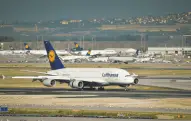President Vladimir Putin is still playing games
Vladimir Putin is becoming a real enigma with each additional year of his already lavish term in office (21 years). The Russian president seems increasingly distant, withdrawn, inaccessible. At the same time, the swings of his system are becoming less and less predictable. Many years ago, Putin said goodbye to his past as a head of state who was open to the market and turned toward the West. Now he seems to be completely caught in the autocratic dilemma that sooner or later afflicts all autocrats.
Putin must pacify his citizens at home, who have more and more reason to revolt, as the Nawalny protests show. At the same time, the power-conscious plutocracy demands its share of the pie. The oligarchs in the ring of protection around Putin will quickly turn against their master when his weaknesses become apparent.
Enemies are assassinated, stable systems undermined
Russia's threatening gestures and its intelligence service's ventures abroad are part of this balancing act because they provide Putin with a narrative for his internal order: Russia is threatened from the outside; the liberal, value-laden world of the West against the fatherland. Military pride, red lines and wonder weapons are all part of this staging, including in Wednesday's State of the Union address. It would have something of an operetta if territories were not annexed, enemies murdered and stable systems undermined by every trick in the book.
The series of Putin surprises does not stop, its frequency has even increased, as if the president would abandon all caution. The deployment of allegedly up to 120,000 troops in the west of the country, the frivolous appearances of the secret service, the red-line rhetoric, the persecution of Nawalny, the attacks against the opposition, the constitutional amendments: Excitement is rising among neighbors and those who try to interpret the Kremlin.
Putin could have two reasons for his behavior
Two explanations are commonly available: The regime is making preparations for the Duma elections in September - for all opponents of the system the most important marking point this year. Or Putin is raising the price for the new American president, testing the U.S. administration and trying to force his way out of international isolation.
To be sure, Putin has always been ahead of the West's linear logic. His most important weapon is surprise - he can deal with reaction. That is why a scenario in which Putin implements his idea of the long-discussed union state between Belarus and Russia, with tough leadership from Moscow, would not be unlikely. The Kremlin and the ruler in Minsk, Alexander Lukashenko, are already getting bogged down in cryptic insinuations. An allegedly foiled attack, a visit to Moscow - the field is set.
It is one of the greatest negligence of the states of Europe that they do not oppose this neighbor in the East, which is as formidable as it is erratic. The West may interpret the events in Russia, but it finds it difficult to ward them off or even to influence them. As if to prove the point, Saxony's prime minister drove to Moscow on Wednesday, just in time for the boiling point of events. If he's lucky, he'll come home with a lesson in strategic boldness.










































